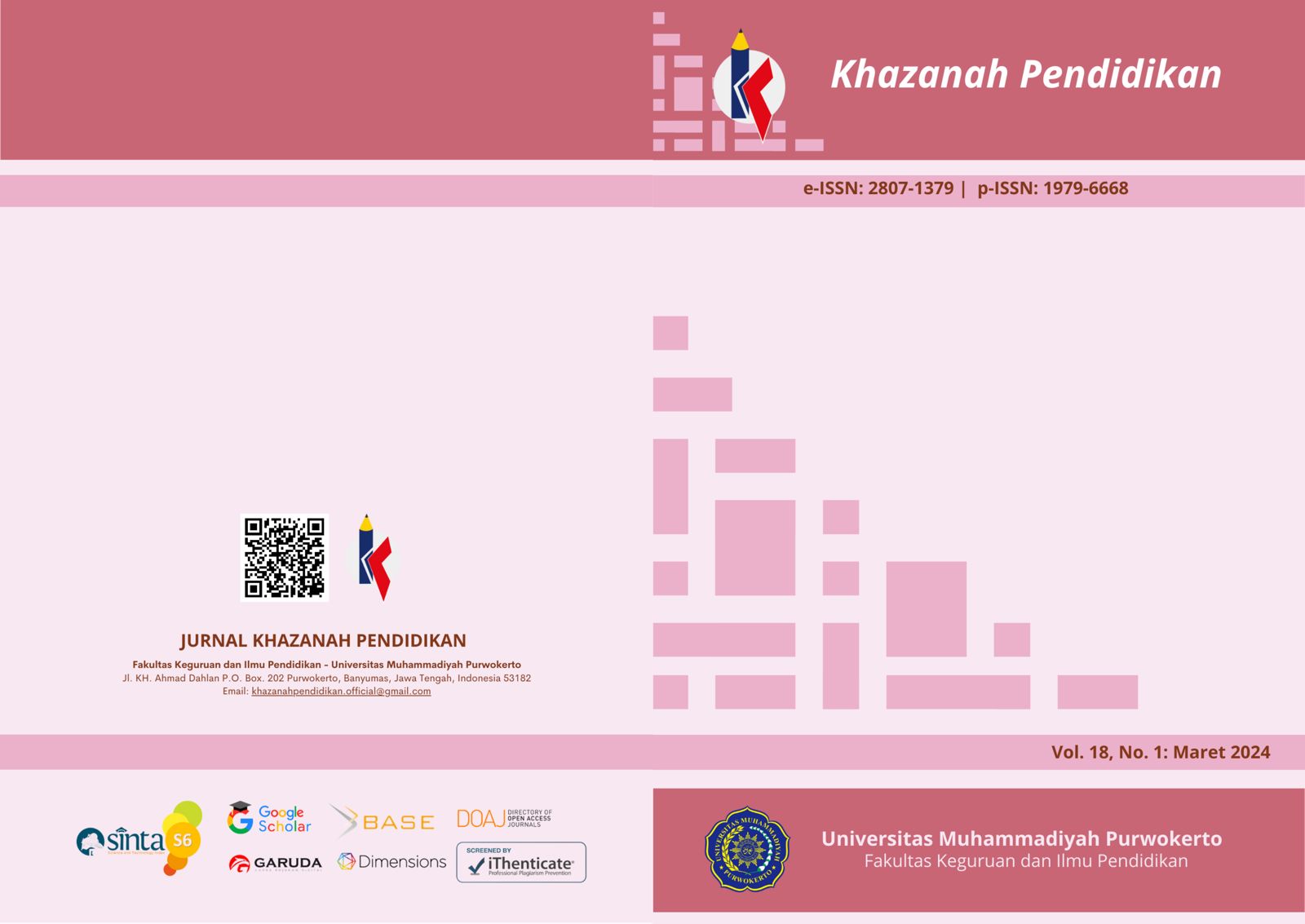PEMBELAJARAN AGAMA ISLAM SEJAK DINI SEBAGAI SARANA KEAGAMAAN DALAM MASYARAKAT MULTIKULTURAL DI ERA DIGITAL
DOI:
https://doi.org/10.30595/jkp.v18i1.21438Keywords:
Multicultural Education, Early Childhood, Digital AgeAbstract
The purpose of writing this article is to find out Islamic religious learning from an early age as a religious means in a multicultural society in the Digital Era, with the rapid pace of technology today certainly has an impact on educational conditions, including in early childhood. Qualitative research method with the type of literature research.. Literature research is a method that utilizes library sources to obtain information or research data. Emphasis on literature research to obtain information or research data. The emphasis of literature research is to find various theories, laws, propositions, principles, opinions, ideas and others that can be used to analyze and solve problems studied in depth from accredited sources. This method can use journals, books, articles or others that are more accurate and up-to-date. There are four steps of literature research: collecting library data, reading and recording and processing research materials. With the findings of the analysis showing that the rapid condition of advances in information and communication technology has a negative impact, therefore multicultural education in this case seeks to provide understanding to the community, especially early childhood students to know about multicultural values, namely acceptance, respect, and respect for all forms of differences. In order not to occur an undesirable condition such as radicalism, racism, discrimination and so on.
References
Aeni, K., & Astuti, T. (2020). Implementasi Nilai-Nilai Multikultural Di Sekolah Dasar. Refleksi Edukatika: Jurnal Ilmiah Kependidikan, 10(2), 178-186.
Ahyat, N. (2017). Metode pembelajaran pendidikan agama Islam. EDUSIANA: Jurnal Manajemen Dan Pendidikan Islam, 4(1), 24-31.
Ali, M. (2017). Hakikat pendidik dalam pendidikan Islam. Tarbawiyah: Jurnal Ilmiah Pendidikan, 11(01), 82-97.
Bararah, I. (2017). Efektifitas perencanaan pembelajaran dalam pembelajaran pendidikan agama islam di sekolah. Jurnal MUDARRISUNA: Media Kajian Pendidikan Agama Islam, 7(1), 131-147.
Elihami, E., & Syahid, A. (2018). Penerapan pembelajaran pendidikan agama islam dalam membentuk karakter pribadi yang islami. Edumaspul: Jurnal Pendidikan, 2(1), 79-96.
Jailani, M., Widodo, H., & Fatimah, S. (2021). Pengembangan Materi Pembelajaran Pendidikan Agama Islam: Implikasinya Terhadap Pendidikan Islam. Al-Idarah: Jurnal Kependidikan Islam, 11(1), 142-155.
Mohammad, A. Y. S. B. (2019). Pembelajaran Pendidikan Agama Islam Berwawasan Multikultural Di Era Digital. In Prosiding Seminar Nasional Prodi Pai Ump.
Rohman, A., & Ningsih, Y. E. (2018, October). Pendidikan multikultural: penguatan identitas nasional di era revolusi industri 4.0. In Prosiding Seminar Nasional Multidisiplin (Vol. 1, pp. 44-50).
Saputra, A. (2018). Pendidikan anak pada usia dini. At-Ta'dib: Jurnal Ilmiah Prodi Pendidikan Agama Islam, 192-209.
Syafrin, Y., Kamal, M., Arifmiboy, A., & Husni, A. (2023). Pelaksanaan Pembelajaran Pendidikan Agama Islam. Educativo: Jurnal Pendidikan, 2(1), 72-77.
Tambak, S. (2017). Metode cooperative learning dalam pembelajaran pendidikan agama Islam. Al-Hikmah: Jurnal Agama Dan Ilmu Pengetahuan, 14(1), 1-17.
Utomo, K. B. (2018). Strategi dan metode pembelajaran pendidikan agama islam mi. MODELING: Jurnal Program Studi PGMI, 5(2), 145-156.
Wahidin, U. (2018). Implementasi literasi media dalam proses pembelajaran pendidikan agama Islam dan budi pekerti. Edukasi Islami: Jurnal Pendidikan Islam, 7(02), 229-244.
Downloads
Published
Issue
Section
License
Authors who publish with this journal agree to the following terms:
Authors retain copyright and grant the journal right of first publication with the work simultaneously licensed under a Creative Commons Attribution License that allows others to share the work with an acknowledgement of the work's authorship and initial publication in this journal.
Authors are able to enter into separate, additional contractual arrangements for the non-exclusive distribution of the journal's published version of the work (e.g., post it to an institutional repository or publish it in a book), with an acknowledgement of its initial publication in this journal.
Authors are permitted and encouraged to post their work online (e.g., in institutional repositories or on their website) prior to and during the submission process, as it can lead to productive exchanges, as well as earlier and greater citation of published work (See The Effect of Open Access).

Khazanah Pendidikan is licensed under a Creative Commons Attribution 4.0 International License.


